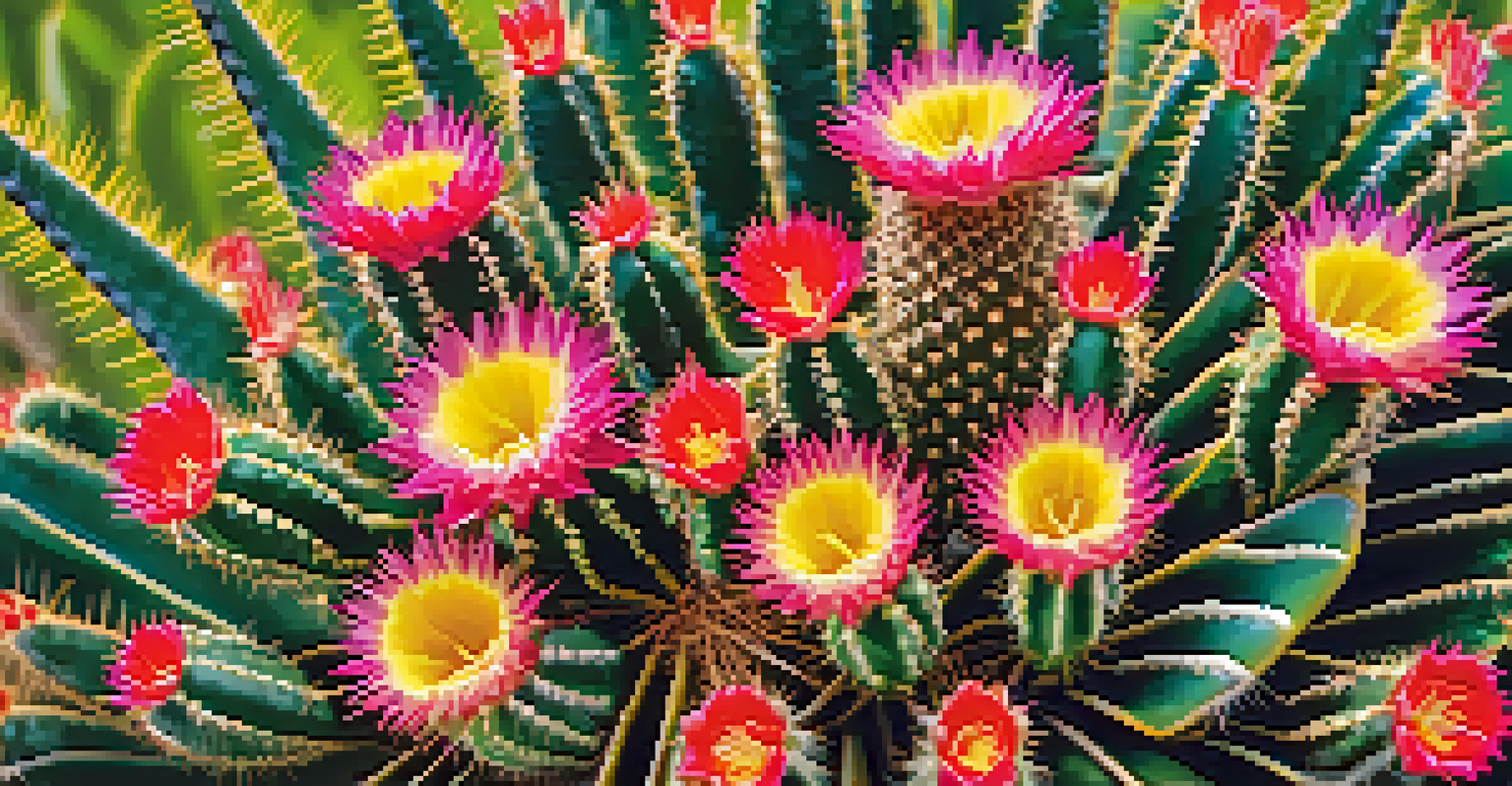Rituals and Healing: The Significance of Peyote Today

Understanding Peyote: A Sacred Plant with Deep Roots
Peyote, a small cactus native to Mexico and the southwestern United States, has been used for thousands of years in various spiritual rituals. This sacred plant contains mescaline, a psychoactive compound that induces altered states of consciousness. For Indigenous peoples, Peyote is not just a plant; it embodies a deep connection to spirituality and tradition.
The experience of Peyote can lead to profound insights and emotional breakthroughs.
Historically, Peyote has been central to the religious practices of many Native American tribes. It serves as a tool for healing, divination, and community bonding. Each Peyote ceremony is often filled with prayer, singing, and drumming, which enhances the experience and fosters a sense of unity among participants.
Today, interest in Peyote is growing beyond Indigenous communities, attracting individuals seeking personal growth or healing. Nonetheless, it’s crucial to approach this plant with respect and understanding, recognizing its significance within its cultural context.
Rituals and Community: The Heart of Peyote Use
Rituals involving Peyote often serve as communal gatherings where participants share their intentions and experiences. These ceremonies provide a safe space for healing, reflection, and connection with others. The shared experience of consuming Peyote can lead to profound insights and emotional breakthroughs.

During these gatherings, the role of the ceremonial leader, often referred to as a 'roadman,' is pivotal. They guide participants through the process, ensuring that the rituals are conducted respectfully and meaningfully. Their experience helps navigate the often intense psychological and emotional landscapes that can arise during the ceremony.
Peyote's Cultural Significance
Peyote is a sacred plant deeply rooted in Indigenous traditions, symbolizing spirituality and community connection.
The communal aspect of Peyote rituals also reinforces social bonds among participants. In a world that can feel increasingly disconnected, these gatherings remind us of the power of community and shared experiences in fostering healing.
Therapeutic Benefits: Peyote in Modern Healing Practices
Recent studies have begun to explore the therapeutic benefits of Peyote, particularly its potential to treat mental health issues such as depression and PTSD. The altered state of consciousness induced by mescaline can facilitate deep introspection, helping individuals confront and process their trauma. This therapeutic avenue is gaining attention in both clinical and alternative medicine circles.
Understanding the cultural context of sacred plants is vital for ethical and respectful use.
In therapeutic settings, Peyote is often administered in a controlled environment, which contrasts with traditional rituals. This approach aims to harness the plant's benefits while minimizing potential risks. Educated practitioners guide clients through their experiences, ensuring they feel safe and supported throughout the process.
However, it’s essential to acknowledge the complexities surrounding the use of Peyote in modern healing. Ethical considerations, cultural appropriation, and the risk of misuse must be carefully navigated to honor the traditions from which these practices emerge.
Cultural Significance: Respecting Indigenous Traditions
The use of Peyote is deeply rooted in Indigenous traditions and should be approached with cultural sensitivity. Many Indigenous communities view Peyote as a sacred gift from the Earth, integral to their spiritual practices. Understanding this context is vital for anyone interested in participating in Peyote ceremonies or using it for healing.
Cultural appropriation is a real concern, where individuals outside of Indigenous cultures adopt practices without understanding their significance. This can lead to the commodification of sacred rituals, stripping them of their meaning and value. Respecting the cultural origins of Peyote is essential to ensure that its use is ethical and appropriate.
Therapeutic Potential of Peyote
Recent studies highlight Peyote's potential to aid in healing mental health issues like depression and PTSD through its psychoactive properties.
Moreover, engaging with Indigenous leaders and communities can provide valuable insights and guidance. Collaborating with those who have historically practiced these rituals helps foster mutual respect and promotes a more authentic understanding of Peyote's role in healing.
Legal Landscape: The Status of Peyote Today
The legal status of Peyote varies widely across different regions, creating a complex landscape for its use. In the United States, Peyote is classified as a Schedule I controlled substance, making it illegal for most individuals to possess or use it. However, exemptions exist for members of recognized Native American tribes, allowing them to use Peyote in religious ceremonies.
In recent years, there has been a growing push for the decriminalization and legalization of psychedelic substances, including Peyote. Advocates argue that these substances can play a significant role in mental health treatment and personal healing. This conversation is part of a broader societal shift towards understanding and integrating alternative healing practices.
Navigating this legal landscape requires awareness of local laws and regulations. Anyone interested in Peyote should ensure they are informed about the legal implications and the importance of participating in respectful, culturally appropriate contexts.
Personal Experiences: The Power of Peyote Journeys
Many individuals who have participated in Peyote ceremonies report transformative experiences that profoundly impact their lives. These journeys often lead to enhanced self-awareness, emotional healing, and a stronger connection to nature and others. Participants frequently describe the experience as a journey of the soul, filled with insights that resonate long after the ceremony ends.
For some, Peyote serves as a catalyst for change, prompting them to reevaluate their life choices and relationships. The introspective nature of the experience can lead to breakthroughs that encourage individuals to pursue healthier lifestyles or mend broken relationships. These personal transformations underscore the potential of Peyote as a tool for profound healing.
Navigating Legal Challenges
The legal status of Peyote varies widely, with specific exemptions for Indigenous tribes, amidst a growing movement for decriminalization.
However, it’s essential to approach these experiences with an open mind and a willingness to engage in the process. Each person's journey with Peyote is unique, and the insights gained can vary widely, reflecting individual needs and life circumstances.
Looking Ahead: The Future of Peyote in Healing and Rituals
As interest in alternative healing practices continues to grow, the future of Peyote in rituals and therapy is likely to evolve. Ongoing research into the therapeutic benefits of Peyote and other psychedelics may lead to greater acceptance and integration within mainstream healthcare. This could open new doors for individuals seeking healing through these ancient practices.
Moreover, increased awareness about the importance of cultural respect and ethical considerations may shape how Peyote is utilized. By fostering dialogue between Indigenous communities and those interested in Peyote, we can ensure that its use is both respectful and beneficial for all parties involved.

Ultimately, the journey of Peyote in modern society reflects a broader search for meaning, connection, and healing. As we navigate this path, it’s essential to honor the traditions from which Peyote originates while exploring its potential for personal and collective transformation.